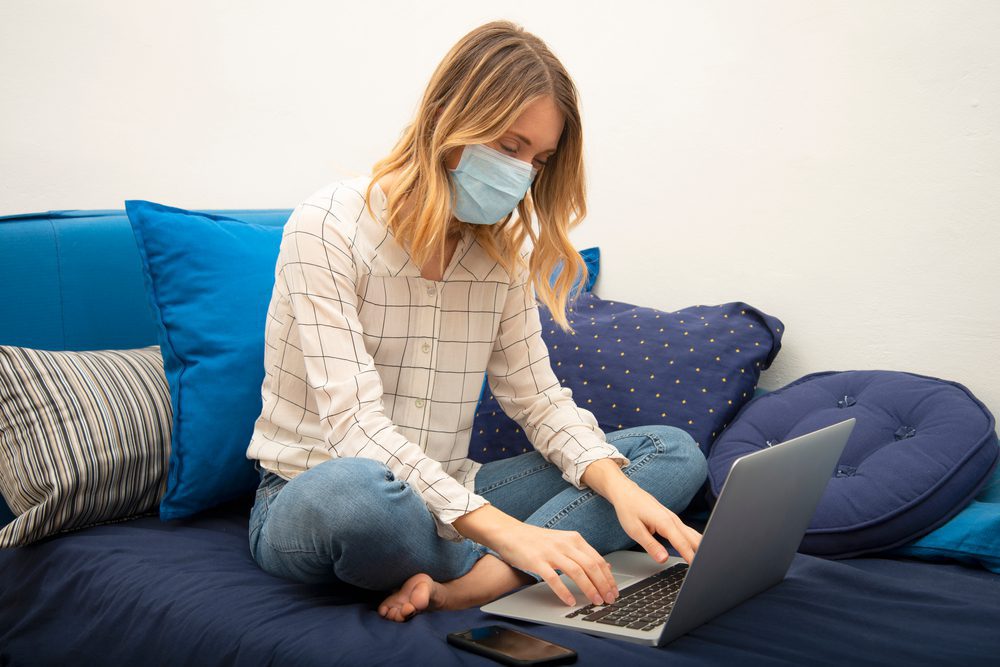As the coronavirus pandemic continues, you may feel that your mental health and well-being have fallen to the wayside. Social distancing is a great way to stay safe from COVID-19, but it may not help your mental health. This is especially true if you’re living with a mental health condition like depression or anxiety.
But how does social isolation affect mental health? And what can you do about it? Today, we’re going to explain how you can improve your mental health while social distancing.
How Does Social Isolation Affect Mental Health and Well-Being?

Throughout human history, we’ve evolved to be social creatures. And whether that means telling stories around our caves or setting up dates with friends and family, our mental and physical health really do depend on social interaction. So much so that the American Psychological Association reports that social isolation can even weaken your immune system. With the coronavirus pandemic, this makes it more important than ever that you follow good mental health practices to protect your physical and mental health.
Social isolation can increase feelings of depression and loneliness. As this affects your mental health, it also harms your physical wellness. And the worse you feel physically, the greater toll this takes on your mental health and well-being. In this way, social isolation can create a vicious cycle, in which your physical and mental health both experience a drastic decline.
This is not to suggest that you should avoid social distancing, however. The coronavirus pandemic is not a reason to panic, but it does pose real danger to people. With this in mind, you should set about making social distancing less isolating for yourself, and then pursue more intensive options if you need them.
Now, let’s discuss what you can do to social distance while safeguarding your mental health and well-being.
Improving Mental Health and Well-Being During COVID-19
If you’re feeling negative emotions due to social distancing, you’re not alone. And while this is a common problem, the good news is that there are several solutions. Look below for ways to improve your mental health and well-being while social distancing due to the coronavirus pandemic.
Manage Stress in Healthy Ways
During times of uncertainty, you may feel intense bouts of stress or anxiety. And while these nervous feelings are normal, there are still things you can do to minimize these issues.
Physical activity can go a long way in helping you manage stress. This could include some at-home workouts, a jog around the block, or even just pacing around your home for thirty minutes a day. However you do it, focus on working physical activity into your daily routine. Not only will this reduce your risk for physical ailments, but it can go a long way in improving your mental health and well-being, too.
Keep in Touch with Friends and Family
Just because you’re social distancing doesn’t mean you have to live in self isolation. Scheduling regular calls with friends and family members is an effective way to keep in touch while keeping everyone safe during the coronavirus pandemic.
That said, there are a few guidelines you should follow on these social calls. First, try to avoid talking too much about COVID-19. It’s obviously an important topic, but focusing solely on it could worsen your feelings of coronavirus depression. Instead, try to talk about mutual interests. These more pleasant topics can help you feel a sense of normalcy, and that can make all the difference for your mental health and well-being.
Reinvest in Your Hobbies

Oftentimes, the daily stressors of life make it difficult to maintain hobbies or passion projects. But now is the perfect time to get back into good habits. Whatever hobby you previously put away, try to pick it back up again now with your free time. Not only will you enjoy the time you spend on your hobby, but you’ll feel more productive having worked on a skill in your newfound downtime.
If you’re struggling to find a hobby that fits you, remember that you can always enroll in an online course. Many certifications are offered for free, and some universities upload their public lectures online. If you’re willing to invest the time, you’ll certainly find plenty of activities to keep you feeling engaged and connected with the world around you.
Get Help If You Need It
For most people, these steps will be enough to make it through the coronavirus pandemic. But if you’re living with a mental health condition, then you might need additional care. Thankfully, the staff at The Blackberry Center are ready and willing to help you improve your mental health and well-being while keeping you safe from the coronavirus. Whether you’re suffering from an anxiety disorder, depression, or any other mental illness, we want to help.
If you have questions about how we can help you, call our admissions specialists at (813) 908-4199 or fill out a digital contact form. Times are uncertain, but we want you to know that you can always get help for your mental health and well-being.

